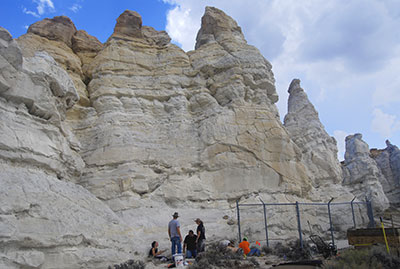Western American Studies students gain practical experience
January 1, 2012

Students enrolled in Central Wyoming College’s Western American Studies program have gained a tremendous amount of practical on-the-job training.
“They’ve worked everywhere from Jackson Hole to Fort Laramie,” said Professor Todd Guenther of his students.
As a result of the Archaeological Resources Protection Act, Guenther said that at any given time several hundred archaeologists are working in Wyoming. With the field work experiences Guenther’s students have, they are often hired to be part of a dig.
“It’s incredible to record history,” said Jordan Stapley, who recently participated with fellow CWC students and Western American Studies alumni at an excavation site at Castle Gardens (cover photo) with local Bureau of Land Management archaeologists. She’s also been hired to work on an excavation project on the Yucatan Peninsula over her Christmas holiday break.
The petroglyph site at Castle Gardens has lured visitors for thousands of years and is managed by the BLM. A hiking trail is being installed as part of a new site plan developed by the BLM’s Lander Field Office, and the 1979 federal law requires a study of cultural resources. Lander BLM archaeologists Craig Bromley and Karina Bryan invited CWC students to participate in the recent excavation. “Not only did our students jump on it, but so did some of our graduates,” Guenther said. “It’s good for them to have that experience on their vita.”
The BLM and student archaeologists dug out places where they found charcoal stains on the surface, indicating the presence of fire pits. They unearthed bison bones and charcoal samples, which will be sent to Florida to date the material. “The petroglyphs in the Castle Gardens area are less than 2,000 years old, but that doesn’t mean people didn’t camp in there before that,” Guenther said, who before joining the CWC faculty was the curator of the Pioneer Museum in Lander as well as the curator at South Pass City historical site.
The students have also received a wealth of experience participating in CWC’s annual summer field studies program. For several years, the students have concentrated their efforts on the middle and upper Sweetwater River area of the Oregon and California Trails, finding some significant artifacts.
This past summer, the students worked for the BLM in eastern Wyoming, excavating the Upper Republican camp sites while dodging tornadoes and hail storms. They discovered pottery, bones from butchered bison, stone tools, and dated the campsite at more than a thousand years old.
The group, supervised by Guenther and adjunct anthropology instructor Jim Stewart, assisted the BLM in the mountains between Casper and Medicine Bow, doing some archaeological surveys.
The student archaeologists also did some excavation at a previously undiscovered 7,800 year-old rock shelter near Lander. “We hope to go back because it’s pretty rich in cultural materials,” Guenther said.
Everything the students collect comes back to the lab in the CWC Intertribal Center where the materials are cataloged. The students also assist Stewart in writing a report, which along with their artifacts goes to a state repository at the University of Wyoming.
“The stuff we collect doesn’t just go into storage,” Guenther explained. “We are part of a big statewide system.” The collections get a lot of attention and the students have made many contacts through this work.
Guenther has encouraged his students to write papers on their finds and present them to such organizations as the Wyoming Association of Professional Archaeologists. Those presentations have opened additional doors to the students in the program, Guenther said.
In past summers, some of Guenther’s students were hired by the Office of the State Archaeologist to excavate a “stratified paleo-site” near Jackson that Guenther estimates is more than 9,000 years old. Several students volunteered to work on a large multi-state project with graduate students from major universities mapping archaeological sites in burn areas in the national forest near Dubois.
“Our freshman and sophomore students from CWC were showing them (graduate students) how to work in the field,” Guenther said. “We start training them for field work here earlier than at most colleges.”
Not only do the students gain valuable experience, they make connections with prominent archaeologists.
Brian Reisig of Lander graduated from the CWC Western American Studies program three years ago and finished his bachelor’s degree at UW. He is now working on a master’s in underwater archaeology at a university in Australia. Graduate Claren Copp LaRoque has worked in Romania and South America on archaeological projects, and Crystal Reynolds, who is finishing her bachelor’s program at the University of Arizona, is excavating Anasazi sites near Tucson.